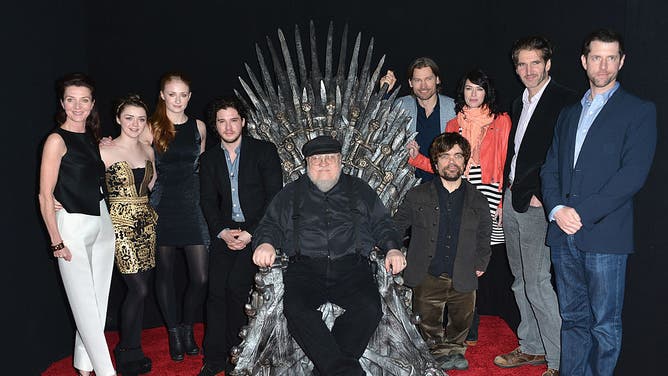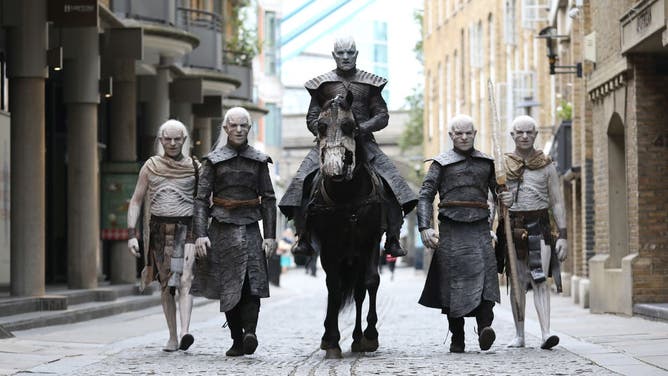HBO Is Expanding The 'Game of Thrones' Universe In The Wrong Direction | Bobby Burack
Game of Thrones aired its final episode five years ago this month. The final season remains one of the most criticized in television history. It felt rushed and convoluted.
Still, HBO remains invested in expanding the Westeros universe. We don't blame them. Game of Thrones was monocultural. The prequel series House of Dragon, which debuted in 2022, is arguably the most popular television/streaming series since Thrones.
But question the direction in which HBO is taking the Westeros universe. Kit Harington recently confirmed that the rumored Jon Snow sequel series was off the table.
"We couldn’t find the right story to tell that we were all excited about enough," said Harington. "So, we decided to lay down tools with it for the time being. There may be a time in the future where we return to it, but at the moment, no. It’s firmly on the shelf."
Snow, the rumored title, was the best bet to remedy the ending of Thrones. Of the many gripes fans have, how Snow's journey ended in the finale is (rightfully) the most profound.
And – spoiler alert – Snow's existence beyond the Wall would make for an enthralling television series.
However, HBO ordered a second prequel series instead, titled Knight of the Seven Kingdoms. The network confirmed this week that the series will debut in 2025.
Knight departs from the intense nature of Thrones and Dragon. The first two series centered around civil wars, treason, inner-family deception, and (a lot) of dragons.
However, Knight isn't based on one of George R.R. Martin's 900-page epic novels, like the other two. Rather, the series is based on Martin's 160-page novella The Hedge Knight. The novella is of a much lighter tone than his novels.
Here is HBO's official description of the new series, set to run only six episodes during its first season:
"A century before the events of Game of Thrones, two unlikely heroes wandered Westeros … a young, naïve but courageous knight, Ser Duncan the Tall, and his diminutive squire, Egg. Set in an age when the Targaryen line still holds the Iron Throne and the memory of the last dragon has not yet passed from living memory, great destinies, powerful foes and dangerous exploits all await these improbable and incomparable friends."

HOLLYWOOD - Actors Michelle Fairley, Maisie Williams, Sophie Turner, Kit Harington, executive producer George R.R. Martin, actors Nikolaj Coster-Waldau, Peter Dinklage, Lena Headey, co-creator/executive producer David Banioff and co-creator/executive producer D.B. Weiss attend The Academy of Television Arts & Sciences' Presents An Evening With "Game of Thrones" at TCL Chinese Theatre on March 19, 2013. (Photo by Alberto E. Rodriguez/Getty Images)
Moving forward with one of Martin's blandest, unknown works is certainly a choice. We are skeptical that a show about two adventurous, not-all-that-dynamic characters wandering around the map has a ceiling that can transcend serious interest beyond fantasy nerds.
Technically, that's fine. However, HBO had some real gems it could have chosen instead.
In addition to the Jon Snow sequel series, HBO previously discussed ordering a series based on Robert's Rebellion.
Robert's Rebellion tells the tale of when Robert Baratheon waged war on the Targaryen dynasty, leading to Jaime Lannister slaying the Mad King, Aerys II Targaryen – allowing Baratheon to ascend the Iron Throne.
Further, Robert's Rebellion is the origin story for several major plot points in Game of Thrones – from Jon Snow's bastardly birth to the rebirth of the dragons.
The network had also considered ordering a project around Aegon, the first Targaryen to rule Westeros. Aegon I Targaryen led the Targaryen Conquest, the most notable period in Westeros lore. Aegon overthrew Westeros on the backs of his three dragons, goes the story.
Riveting.
Alternatively, HBO chose to tell a story about Ser Duncan the Tall and his pal Egg.

LONDON - The Night King and White Walkers march through London to promote the forthcoming Game Of Thrones Season 7 on July 11, 2017. (Photo by Tim P. Whitby/Getty Images)
In 2019, HBO shot a pilot for another prequel series called Bloodmoon. The synopsis was intriguing, set almost 5,000 years before Thrones. Bloodmoon intended to depict the events of the Long Night and the still-untold origin of the White Walkers.
Of all the rumored series, a series about the White Walkers had me most interested.
Unfortunately, HBO quashed the project, for reasons unknown, after reviewing the pilot.
Of course, HBO could revisit any of those projects (besides Bloodmoon) at a later date. However, parent company WBD is already in cost-cutting mode. Producing any series set in Westeros requires a budget that rivals high-profile films in Hollywood. The first season of House of the Dragon cost $200 million to produce, marking the most expensive show in HBO history.
Plus, airing more than two shows from the same universe at once risks serious confusion and overkill.
Translation: Knight of the Seven Kingdoms will likely be the last Game of Thrones spin-off for a while, perhaps this decade.
Shrug.